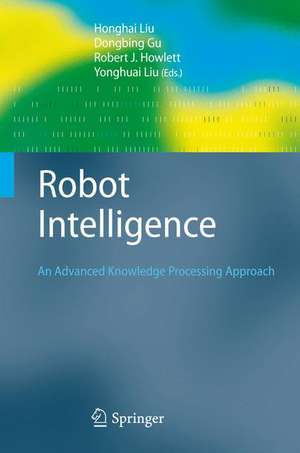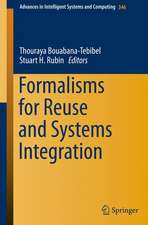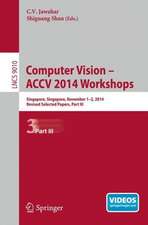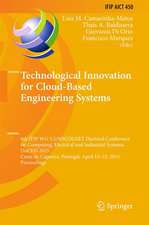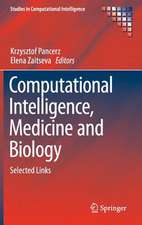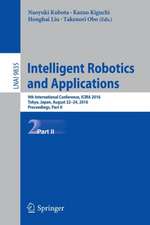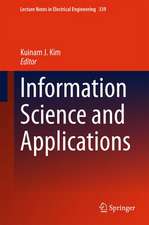Robot Intelligence: An Advanced Knowledge Processing Approach: Advanced Information and Knowledge Processing
Editat de Honghai Liu, Dongbing Gu, Robert J. Howlett, Yonghuai Liuen Limba Engleză Hardback – 20 aug 2010
| Toate formatele și edițiile | Preț | Express |
|---|---|---|
| Paperback (1) | 878.38 lei 38-44 zile | |
| SPRINGER LONDON – 13 oct 2012 | 878.38 lei 38-44 zile | |
| Hardback (1) | 993.93 lei 6-8 săpt. | |
| SPRINGER LONDON – 20 aug 2010 | 993.93 lei 6-8 săpt. |
Din seria Advanced Information and Knowledge Processing
- 20%
 Preț: 330.44 lei
Preț: 330.44 lei - 20%
 Preț: 53.43 lei
Preț: 53.43 lei - 20%
 Preț: 1042.28 lei
Preț: 1042.28 lei - 18%
 Preț: 726.85 lei
Preț: 726.85 lei - 20%
 Preț: 646.30 lei
Preț: 646.30 lei - 20%
 Preț: 990.80 lei
Preț: 990.80 lei - 20%
 Preț: 647.61 lei
Preț: 647.61 lei - 20%
 Preț: 996.56 lei
Preț: 996.56 lei - 20%
 Preț: 994.40 lei
Preț: 994.40 lei - 20%
 Preț: 985.03 lei
Preț: 985.03 lei - 20%
 Preț: 654.37 lei
Preț: 654.37 lei - 20%
 Preț: 989.79 lei
Preț: 989.79 lei - 20%
 Preț: 991.27 lei
Preț: 991.27 lei - 15%
 Preț: 645.79 lei
Preț: 645.79 lei - 20%
 Preț: 817.55 lei
Preț: 817.55 lei - 20%
 Preț: 991.46 lei
Preț: 991.46 lei - 18%
 Preț: 1114.83 lei
Preț: 1114.83 lei - 20%
 Preț: 589.93 lei
Preț: 589.93 lei - 20%
 Preț: 995.75 lei
Preț: 995.75 lei -
 Preț: 454.92 lei
Preț: 454.92 lei - 20%
 Preț: 992.62 lei
Preț: 992.62 lei - 20%
 Preț: 645.14 lei
Preț: 645.14 lei - 20%
 Preț: 647.61 lei
Preț: 647.61 lei - 20%
 Preț: 638.69 lei
Preț: 638.69 lei - 18%
 Preț: 955.08 lei
Preț: 955.08 lei - 20%
 Preț: 643.97 lei
Preț: 643.97 lei - 20%
 Preț: 983.02 lei
Preț: 983.02 lei - 20%
 Preț: 645.31 lei
Preț: 645.31 lei - 18%
 Preț: 950.96 lei
Preț: 950.96 lei - 20%
 Preț: 921.17 lei
Preț: 921.17 lei - 20%
 Preț: 653.71 lei
Preț: 653.71 lei - 20%
 Preț: 988.00 lei
Preț: 988.00 lei - 18%
 Preț: 947.67 lei
Preț: 947.67 lei - 20%
 Preț: 1004.99 lei
Preț: 1004.99 lei - 20%
 Preț: 650.92 lei
Preț: 650.92 lei - 20%
 Preț: 998.21 lei
Preț: 998.21 lei - 20%
 Preț: 642.65 lei
Preț: 642.65 lei - 20%
 Preț: 988.00 lei
Preț: 988.00 lei - 20%
 Preț: 997.38 lei
Preț: 997.38 lei - 20%
 Preț: 650.59 lei
Preț: 650.59 lei - 20%
 Preț: 647.61 lei
Preț: 647.61 lei
Preț: 993.93 lei
Preț vechi: 1242.41 lei
-20% Nou
Puncte Express: 1491
Preț estimativ în valută:
190.25€ • 206.72$ • 159.91£
190.25€ • 206.72$ • 159.91£
Carte tipărită la comandă
Livrare economică 21 aprilie-05 mai
Preluare comenzi: 021 569.72.76
Specificații
ISBN-13: 9781849963282
ISBN-10: 1849963282
Pagini: 316
Ilustrații: XIV, 294 p.
Dimensiuni: 155 x 235 x 25 mm
Greutate: 0.61 kg
Ediția:2010
Editura: SPRINGER LONDON
Colecția Springer
Seria Advanced Information and Knowledge Processing
Locul publicării:London, United Kingdom
ISBN-10: 1849963282
Pagini: 316
Ilustrații: XIV, 294 p.
Dimensiuni: 155 x 235 x 25 mm
Greutate: 0.61 kg
Ediția:2010
Editura: SPRINGER LONDON
Colecția Springer
Seria Advanced Information and Knowledge Processing
Locul publicării:London, United Kingdom
Public țintă
ResearchCuprins
Programming-by-Demonstration of Robot Motions.- Grasp Recognition by Fuzzy Modeling and Hidden Markov Models.- Distributed Adaptive Coordinated Control of Multi-Manipulator Systems Using Neural Networks.- A New Framework for View-Invariant Human Action Recognition.- Using Fuzzy Gaussian Inference and Genetic Programming to Classify 3D Human Motions.- Obstacle Detection Using Cross-Ratio and Disparity Velocity.- Learning and Vision-Based Obstacle Avoidance and Navigation.- A Fraction Distortion Model for Accurate Camera Calibration and Correction.- A Leader-Follower Flocking System Based on Estimated Flocking Center.- A Behavior Based Control System for Surveillance UAVs.- Hierarchical Composite Anti-Disturbance Control for Robotic Systems Using Robust Disturbance Observer.- Autonomous Navigation for Mobile Robots with Human-Robot Interaction.- Prediction-Based Perceptual System of a Partner Robot for Natural Communication.
Recenzii
From the reviews:
“This book’s 13 chapters are a unique collection of research in which machine learning extends into robotic intelligence in order to develop robots that are more complex and adaptable to their dynamic environments. … There is something here for everyone great ideas, sufficient theoretical backups, and excellent case studies with real robots in action. Summing Up: Highly recommended. Upper-division undergraduates and above.” (G. Trajkovski, Choice, Vol. 48 (7), March, 2011)
“This book was a welcome surprise: it is short, but includes many topics relevant to the robotics research community. … Another interesting aspect of the book is that almost every chapter includes physical experiments. … Researchers and PhD students interested in the latest approaches and techniques in robotics will be most interested in this book. It is especially appropriate for researchers interested in the fields of manipulator robots and social robots (robots that interact with human beings).” (Ramon Gonzalez Sanchez, ACM Computing Reviews, January, 2012)
“This book’s 13 chapters are a unique collection of research in which machine learning extends into robotic intelligence in order to develop robots that are more complex and adaptable to their dynamic environments. … There is something here for everyone great ideas, sufficient theoretical backups, and excellent case studies with real robots in action. Summing Up: Highly recommended. Upper-division undergraduates and above.” (G. Trajkovski, Choice, Vol. 48 (7), March, 2011)
“This book was a welcome surprise: it is short, but includes many topics relevant to the robotics research community. … Another interesting aspect of the book is that almost every chapter includes physical experiments. … Researchers and PhD students interested in the latest approaches and techniques in robotics will be most interested in this book. It is especially appropriate for researchers interested in the fields of manipulator robots and social robots (robots that interact with human beings).” (Ramon Gonzalez Sanchez, ACM Computing Reviews, January, 2012)
Notă biografică
Dr. Honghai Liu is a Reader and Head of Intelligent Systems & Robotics Research Group (ISR), School of Creative Technologies, at the University of Portsmouth. He previously held research appointments at the Departments of Computing Science and Engineering in the Universities of London and Aberdeen, and project leader appointments in large-scale industrial control and system integration industry. Honghai has published over 150 refereed journal and conference papers including three Best Paper Awards. He is interested in approximate computation, machine intelligence, pattern recognition and their practical applications with an emphasis on approaches which could make contribution to the intelligent connection of perception to action in systems context. For this emphasis, he has been developing a framework based on approximate computing and it has been implemented into human motion analysis, multifingered robot manipulation, data novelty detection and intelligent control for electric vehicle suspensions with substantial results. He is a Senior Member of IEEE and a Member of IET.
Dongbing Gu’s current research interests include multi-agent systems, wireless sensor networks, distributed control algorithms, distributed information fusion, cooperative control, reinforcement learning, fuzzy logic and neural network based motion control, model predictive control, wavelet multi-scale image edge detection, and Bayesian multi-scale image segmentation. His work combines fundamental concepts and tools from computer science, networks, systems and control theory.
Robert Howlett has considerable expertise in the use of Intelligent Systems in the solution of industrial problems. He has been successful in applying neural networks, expert & fuzzy methods, web intelligence and related technology to: Sustainability: renewable energy, measurement, control, simulation and modeling of energy systems; Condition monitoring: diagnostictools and systems; fault location and identification; virtual sensors; Automotive electronics: engine management systems; monitoring and control of small engines. He is the Executive Chair of the UKES Internationalorganization, which facilitates knowledge transfer and research in areas including Intelligent Systems, Sustainability, and Knowledge Transfer. Through the UKES Smart Systems Centre he provides consultancy services on, for example, Knowledge Transfer Partnerships the EU Interreg Anglo-French funding programme, and technical subjects within his expertise. By setting up and managing over 20 collaborative projects with SMEs and other companies, managing the University of Brighton Knowledge Transfer Partnerships (KTP) Centre for a number of years, and Chairmanship of the KTP National Forum, he has become nationally recognised in knowledge and technology transfer, the commercialisation of research, and the third-mission agenda.
Dr Yonghuai Liu has completed BSc and MSc studies and also holds two PhDs. Younghuai gained solid knowledge in the fields of Geography, Cartography, Mathematics, and Economics whilst studying for the BSc degree. Whilst studying for the MSc degree he gained knowledge in the fields of Pattern Recognition, Image Processing, and Mathematics. PhD study in China which gave him solid knowledge in the fields of Artificial Intelligence, Uncertain Reasoning, and also Mathematics. During this period of time, Yonghuai researched on Uncertain Reasoning, Expert Systems, Artificial Intelligence, Pattern Recognition, Image Processing, and Multimedia and taught both undergraduate and postgraduate courses on Artificial Intelligence, Discrete Mathematics, Combinatorial Mathematics, and Multimedia. Younghuai received the ORS award. As a result, he studied for his second PhD degree at The University of Hull under the supervision of Dr Marcos A Rodrigues. He is currently a lecturer at the Department of Computer Science, The University of Wales,Aberystwyth.
Dongbing Gu’s current research interests include multi-agent systems, wireless sensor networks, distributed control algorithms, distributed information fusion, cooperative control, reinforcement learning, fuzzy logic and neural network based motion control, model predictive control, wavelet multi-scale image edge detection, and Bayesian multi-scale image segmentation. His work combines fundamental concepts and tools from computer science, networks, systems and control theory.
Robert Howlett has considerable expertise in the use of Intelligent Systems in the solution of industrial problems. He has been successful in applying neural networks, expert & fuzzy methods, web intelligence and related technology to: Sustainability: renewable energy, measurement, control, simulation and modeling of energy systems; Condition monitoring: diagnostictools and systems; fault location and identification; virtual sensors; Automotive electronics: engine management systems; monitoring and control of small engines. He is the Executive Chair of the UKES Internationalorganization, which facilitates knowledge transfer and research in areas including Intelligent Systems, Sustainability, and Knowledge Transfer. Through the UKES Smart Systems Centre he provides consultancy services on, for example, Knowledge Transfer Partnerships the EU Interreg Anglo-French funding programme, and technical subjects within his expertise. By setting up and managing over 20 collaborative projects with SMEs and other companies, managing the University of Brighton Knowledge Transfer Partnerships (KTP) Centre for a number of years, and Chairmanship of the KTP National Forum, he has become nationally recognised in knowledge and technology transfer, the commercialisation of research, and the third-mission agenda.
Dr Yonghuai Liu has completed BSc and MSc studies and also holds two PhDs. Younghuai gained solid knowledge in the fields of Geography, Cartography, Mathematics, and Economics whilst studying for the BSc degree. Whilst studying for the MSc degree he gained knowledge in the fields of Pattern Recognition, Image Processing, and Mathematics. PhD study in China which gave him solid knowledge in the fields of Artificial Intelligence, Uncertain Reasoning, and also Mathematics. During this period of time, Yonghuai researched on Uncertain Reasoning, Expert Systems, Artificial Intelligence, Pattern Recognition, Image Processing, and Multimedia and taught both undergraduate and postgraduate courses on Artificial Intelligence, Discrete Mathematics, Combinatorial Mathematics, and Multimedia. Younghuai received the ORS award. As a result, he studied for his second PhD degree at The University of Hull under the supervision of Dr Marcos A Rodrigues. He is currently a lecturer at the Department of Computer Science, The University of Wales,Aberystwyth.
Textul de pe ultima copertă
Robot Intelligence is an exciting interdisciplinary field including engineering, information technology, machine learning, biological science and psychology. Its dramatic growth in practical applications is driven by both real-world requirements and maturity of related disciplines such as intelligent algorithms. It is expected that perception, understanding and reasoning capabilities play a crucial role in robot-assisted tasks and enable robots to exhibit similar performance on executing various tasks in both constrained and unconstrained environments.
Robot Intelligence is a rare collection of chapters reflecting recent robotics developments from the advanced knowledge processing perspective. It also provides a comprehensive introduction and methodology to selected robotics topics including human robot interaction, human motion analysis, robot vision and advanced control. The robot intelligence methods presented enable readers to address many complex problems involving a wide range of robot sensors for the perception and understanding of the environment and the reasoning of the subsequent actions. The book’s comprehensive coverage will prove invaluable to senior undergraduates, PhD students, researchers and practitioners.
Robot Intelligence is a rare collection of chapters reflecting recent robotics developments from the advanced knowledge processing perspective. It also provides a comprehensive introduction and methodology to selected robotics topics including human robot interaction, human motion analysis, robot vision and advanced control. The robot intelligence methods presented enable readers to address many complex problems involving a wide range of robot sensors for the perception and understanding of the environment and the reasoning of the subsequent actions. The book’s comprehensive coverage will prove invaluable to senior undergraduates, PhD students, researchers and practitioners.
Caracteristici
Recent innovations on robot learning and adaptive methods Advanced knowledge-based qualitative reasoning Integration of robot learning and robot control Includes supplementary material: sn.pub/extras
